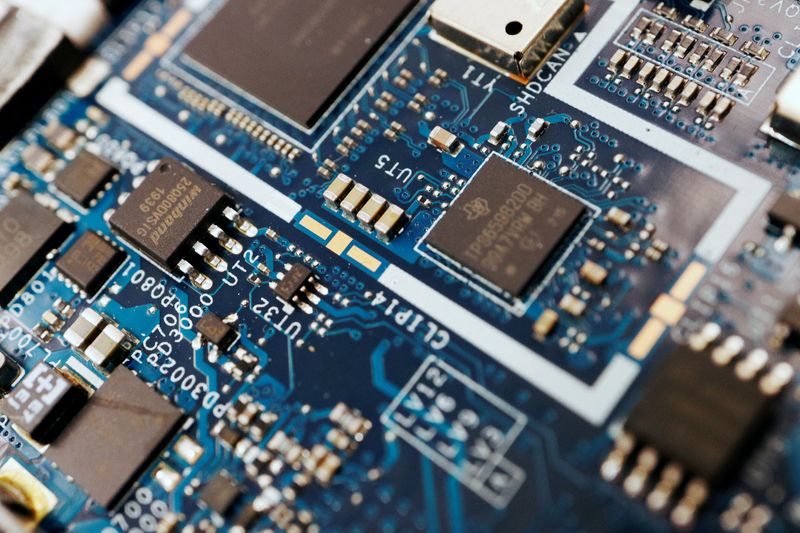By Karen Freifeld and Alexandra Alper
WASHINGTON(Reuters) -The Biden administration plans next month to broaden curbs on U.S shipments to China of semiconductors used for artificial intelligence and chipmaking tools, several people familiar with the matter said.
The Commerce Department intends to publish new regulations based on restrictions communicated in letters earlier this year to three U.S. companies -- KLA Corp, Lam Research Corp (NASDAQ:LRCX) and Applied Materials Inc (NASDAQ:AMAT), the people said, speaking on the condition of anonymity. The plan for new rules has not been previously reported.
The letters, which the companies publicly acknowledged, forbade them from exporting chipmaking equipment to Chinese factories that produce advanced semiconductors with sub-14 nanometer processes unless the sellers obtain Commerce Department licenses.
The rules would also codify restrictions in Commerce Department letters sent to Nvidia (NASDAQ:NVDA) Corp and Advanced Micro Devices (NASDAQ:AMD) last month instructing them to halt shipments of several artificial intelligence computing chips to China unless they obtain licenses.
Some of the sources said the regulations would likely include additional actions against China. The restrictions could also be changed and the rules published later than expected.
So-called "is informed" letters allow the Commerce Department to bypass lengthy rule-writing processes to put controls in place quickly, but the letters only apply to the companies that receive them.
Turning the letters into rules would broaden their reach and could subject other U.S. companies producing similar technology to the restrictions. The regulations could potentially apply to companies trying to challenge Nvidia and AMD's dominance in artificial intelligence chips.
Intel Corp (NASDAQ:INTC) and startups like Cerebras Systems are targeting the same advanced computing markets. Intel said it is closely monitoring the situation, while Cerebras declined to comment.
One source said the rules could also impose license requirements on shipments to China of products that contain the targeted chips. Dell Technologies (NYSE:DELL), Hewlett Packard Enterprise (NYSE:HPE) and Super Micro Computer (NASDAQ:SMCI) make data center servers that contain Nvidia's A100 chip.
Dell and HPE said they were monitoring the situation, while Super Micro Computer did not respond to a request for comment.
A senior Commerce official declined to comment on the upcoming action, but said: "As a general rule, we look to codify any restrictions that are in is-informed letters with a regulatory change."
A spokesperson for the Commerce Department on Friday declined to comment on specific regulations but reiterated that it is "taking a comprehensive approach to implement additional actions...to protect U.S. national security and foreign policy interests," including to keep China from acquiring U.S. technology applicable to military modernization.
KLA, Applied Materials and Nvidia declined to comment while Lam did not respond to requests for comment. AMD did not comment on the specific policy move but reaffirmed it does not foresee a "material impact" from its new licensing requirement.
'CHOKE POINT'
The planned action comes as the President Joe Biden's administration has sought to thwart China's advances by targeting technologies where the United States still maintains dominance.
"The strategy is to choke off China and they have discovered that chips are a choke point. They can't make this stuff, they can't make the manufacturing equipment," said Jim Lewis a technology expert at the Center for Strategic and International Studies. "That will change."
In an update on China-related measures last week, the Chamber of Commerce, a U.S. business lobbying group, warned members of imminent restrictions on AI chips and chipmaking tools.
"We are now hearing that members should expect a series of rules or perhaps an overarching rule prior to the mid-term election to codify the guidance in recently issued (Commerce Department) 'is-informed' letters to chip equipment and chip design companies," the Chamber said.
The Chamber of Commerce and the Chinese embassy in Washington did not immediately respond to requests for comment.
The group also said the agency plans to add additional Chinese supercomputing entities to a trade blacklist.
Reuters was first to report in July that the Biden administration was actively discussing banning exports of chipmaking tools to Chinese factories that make advanced semiconductors at the 14 nanometer node and smaller.

U.S. officials have reached out to allies to lobby them to enact similar policies so that foreign companies would not be able to sell technology to China that American firms would be barred from shipping, two of the sources said.
“Coordination with allies is key to maximizing effectiveness and minimizing unintended consequences," Clete Willems, a former Trump administration trade official said. "This should favor broader regulations that others can replicate instead of one-off 'is informed' letters."